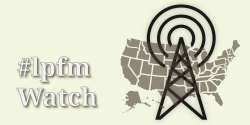Last Friday the Media Bureau gave a presentation on its progress with LPFM to the full Commission during the FCC’s June open meeting. The Bureau reported some interesting facts about this licensing window.
For instance, the most applications were filed in Texas (303), California (285), Florida (276) and Oregon (91). The first 3 states aren’t much of a surprise, given that they are amongst the nation’s most populous (coming in at 2, 1 and 4, respectively). Oregon, however, is a bit more unexpected, since it’s the 28th most populous state.
Although the last six weeks have seemed slow for LPFM application approvals compared to the first few months of the year, it turns out that the Commission is moving much faster than the first LPFM licensing window in 2000–2001. 1200 construction permits were issued within the first 6 months after the application window closed, while it took the FCC 4 years to reach that number in the early 2000s.
The Media Bureau also reported that there are 351 applications still pending in the nation’s top 30 markets. So far in this window 44 construction permits have been issued in these markets, and there were only 53 LPFM stations total in the Top 30 prior to 2013.
Back in January when the final tally of LPFM applications was released by the FCC, many community radio supporters were disappointed in that number, especially given that it was 400 fewer than the number of applications submitted in the first go-round in 2000. However, the Commission reports that despite this differential there will be anywhere from 175 to 475 more construction permits granted from this last window. The revised rules from the Local Community Radio Act and more than a decade of experience within the LPFM community both probably contributed to this higher success rate.
11 Guel-Associated Applicants Petition for Reconsideration
Also reported at Friday’s open meeting was that the FCC’s legal department is dealing with an “unprecedented” number of objections filed against LPFM applications. We’ve reported on some of those objections here. Perhaps the most prominent case is that of 245 applications associated with one man, Antonio Guel. So far a total of 93 of those applications have been dismissed or withdrawn, while 150 are pending.
This week the attorney representing 11 applicants that were dismissed filed a petition for reconsideration with the FCC. 7 of these applications were dismissed because the FCC found that the proposed transmitter sites were not actually secured for the purpose of building a station. In the petition these applicants attest that their proposed transmitter sites are indeed available to them.
4 applications were dismissed for having filed amendments to the applications for major ownership changes that the Commission found to be improper. These applicants argue that the Commission’s finding is in error, and that additional amendments that they believe conform to the rules have been filed.
Now, the reason why objections have been filed against these and 234 other applications are that there is the appearance that they may not be from individual community-based applicants, but rather from astroturf applicants that seem to be operating under the direction of Mr. Guel. The problems with ownership and transmitter site permission track relate to the supposition that these aren’t legitimate applicants that are local to the communities they purport to be from.
With very few exceptions, LPFM licenses are only supposed to go to groups that have no other broadcast licenses. The whole point of LPFM is not to allow individuals or groups to amass large networks of stations.
It will be interesting to see the Commissions’ response to this petition, especially considering that 11 applicants filed in aggregate.



